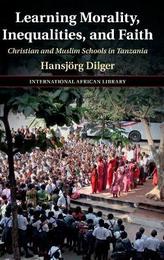
|
Learning Morality, Inequalities, and Faith: Christian and Muslim Schools in Tanzania
Hardback
Main Details
| Title |
Learning Morality, Inequalities, and Faith: Christian and Muslim Schools in Tanzania
|
| Authors and Contributors |
By (author) Hansjoerg Dilger
|
| Series | The International African Library |
|---|
| Physical Properties |
| Format:Hardback | | Pages:292 | | Dimensions(mm): Height 236,Width 159 |
|
| Category/Genre | History
World history
African history |
|---|
| ISBN/Barcode |
9781316514221
|
| Classifications | Dewey:371.0709678 |
|---|
| Audience | | Professional & Vocational | |
|---|
| Illustrations |
Worked examples or Exercises
|
|
Publishing Details |
| Publisher |
Cambridge University Press
|
| Imprint |
Cambridge University Press
|
| Publication Date |
16 December 2021 |
| Publication Country |
United Kingdom
|
Description
Christian and Muslim schools have become important target points in families and pupils' quests for new study opportunities and securing a 'good life' in Tanzania. These schools combine secular education with the moral (self-)formation of young people, triggering new realignments of the fields of education with interreligious co-existence and class formation in the country's urban centres. Hansjoerg Dilger explores the emerging entanglements of faith, morality, and the educational market in Dar es Salaam, thereby shedding light on processes of religious institutionalisation and their individual and collective embodiment. By contextualising these dynamics through analysis of the politics of Christian-Muslim relations in postcolonial Tanzania, this book shows how the field of education has shaped the positions of these highly diverse religious communities in diverging ways. In doing so, Dilger suggests that students and teachers' religious experience and practice in faith-oriented schools are shaped by the search for socio-moral belonging as well as by the power relations and inequalities of an interconnected world.
Author Biography
Hansjoerg Dilger is Professor of Social and Cultural Anthropology at Freie Universitat Berlin. His research interests include the anthropology of religion and religious diversity, critical medical anthropology, and the study of global and transnational processes. He is co-editor of Affective Trajectories: Religion and Emotion in African Cityscapes (2020).
Reviews'A timely and critical analysis of inequality, politics, and power in Tanzania. Dilger shows how religiously diverse discursive and social practices are constructed and reconstructed through specific material conditions which disproportionately position educational institutions in relation to their faith.' Thomas Ndaluka, University of Dar es Salaam 'A powerful analysis of religion and education in Tanzania. Dilger's insightful and sensitive handling of a rich range of sources is impressive. This is an important contribution to our understanding of the intersection of schools and states, markets and inequalities.' Amy Stambach, University of Wisconsin, Madison 'Focusing primarily on Tanzania (although the reflections and data could be extended to many multi-religious societies), this is a brilliant and novel approach to the study and understanding of Religious Education in Africa. Scholars, researchers, and laypersons who want to engage with the place of religion in the education market under (post-)neoliberal conditions have a well-researched, accessibly written source in Dilger's work. This book is a foremost contribution to the debate on and understanding of how religion works in educational development and how education works in religious development.' Asonzeh Ukah, University of Cape Town 'Fee-paying faith-oriented schools are playing an increasingly important role for education provision in a wider context of growing inequalities and neoliberal politics. Exploring Christian and Muslim schools in Tanzania from a comparative perspective, Dilger expertly addresses timely questions about how the quest for moral becoming and the marketization of education intertwine. His book is thoughtful, sensitive, and richly detailed - a compelling read with much to offer to anyone interested in religion, morality, inequality, and education.' Hannah Hoechner, University of East Anglia
|